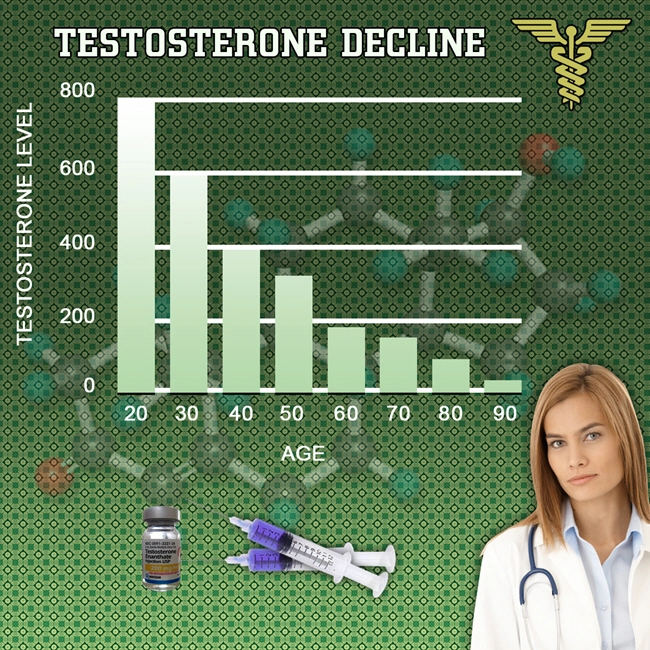
Introduction
Testosterone Cypionate, a commonly prescribed form of testosterone replacement therapy (TRT), has been increasingly utilized among American men to address symptoms of hypogonadism, such as low libido, fatigue, and decreased muscle mass. While its benefits are well-documented, understanding its impact on the hematological system is crucial for ensuring patient safety and optimizing therapeutic outcomes.
Mechanism of Action
Testosterone Cypionate functions by mimicking the natural hormone testosterone, which plays a pivotal role in numerous physiological processes, including erythropoiesis—the production of red blood cells. The hormone stimulates the release of erythropoietin from the kidneys, which in turn promotes the proliferation and differentiation of erythroid progenitor cells in the bone marrow, ultimately leading to an increase in red blood cell mass.
Impact on Hematocrit and Hemoglobin Levels
Clinical studies have consistently demonstrated that Testosterone Cypionate administration can lead to an elevation in hematocrit and hemoglobin levels. This rise is generally considered beneficial, as it enhances oxygen-carrying capacity and can improve overall physical performance. However, it is essential to monitor these levels closely, as excessively high hematocrit can increase the risk of thrombotic events, such as strokes and myocardial infarctions.
Risk of Polycythemia
One of the most significant hematological concerns associated with Testosterone Cypionate is the development of polycythemia, a condition characterized by an abnormally high concentration of red blood cells. Polycythemia can lead to increased blood viscosity, which may impede blood flow and heighten the risk of cardiovascular complications. Regular monitoring of hematocrit levels is recommended, and if levels exceed 54%, a reduction or cessation of TRT may be necessary.
Influence on Other Blood Parameters
Beyond its effects on red blood cell production, Testosterone Cypionate can also influence other hematological parameters. For instance, it may lead to a slight increase in platelet count, although this effect is typically modest and not clinically significant. Additionally, some studies suggest that testosterone therapy might affect white blood cell counts, but the evidence remains inconclusive and requires further investigation.
Clinical Monitoring and Management
Effective management of Testosterone Cypionate therapy necessitates regular hematological monitoring. Baseline hematocrit and hemoglobin levels should be established before initiating treatment, with follow-up assessments conducted every three to six months. If significant elevations are observed, dose adjustments or alternative treatments should be considered. Moreover, patients should be educated about the signs and symptoms of polycythemia, such as headache, dizziness, and shortness of breath, and encouraged to seek medical attention if these symptoms arise.
Conclusion
Testosterone Cypionate offers substantial benefits for American men suffering from hypogonadism, but its impact on the hematological system warrants careful consideration. By understanding the mechanisms through which it affects red blood cell production and recognizing the potential risks of polycythemia, healthcare providers can better manage therapy and safeguard patient health. Ongoing research and vigilant monitoring will continue to enhance our understanding and optimize the use of this vital therapeutic agent.
Contact Us Today For A Free Consultation
Dear Patient,
Once you have completing the above contact form, for security purposes and confirmation, please confirm your information by calling us.
Please call now: 1-800-380-5339.
Welcoming You To Our Clinic, Professor Tom Henderson.

- Testosterone Cypionate: Benefits, Risks, and Holistic Management for Aging American Men [Last Updated On: March 1st, 2025] [Originally Added On: March 1st, 2025]
- Testosterone Cypionate: Enhancing Male Health Through Injection Therapy [Last Updated On: March 17th, 2025] [Originally Added On: March 17th, 2025]
- Testosterone Cypionate's Impact on Sleep Patterns in American Males: A Comprehensive Analysis [Last Updated On: March 18th, 2025] [Originally Added On: March 18th, 2025]
- Testosterone Cypionate Stigma in American Males: Origins, Impacts, and Destigmatization Strategies [Last Updated On: March 18th, 2025] [Originally Added On: March 18th, 2025]
- Strategies to Minimize Side Effects of Testosterone Cypionate in American Men [Last Updated On: March 18th, 2025] [Originally Added On: March 18th, 2025]
- Testosterone Cypionate: Enhancing Weight Management in American Men [Last Updated On: March 19th, 2025] [Originally Added On: March 19th, 2025]
- Navigating Insurance for Testosterone Cypionate Therapy: A Guide for American Males [Last Updated On: March 19th, 2025] [Originally Added On: March 19th, 2025]
- Testosterone Cypionate: Impacts on Prostate Health in American Men [Last Updated On: March 19th, 2025] [Originally Added On: March 19th, 2025]
- Testosterone Cypionate: Benefits, Risks, and Long-Term Health Impacts on American Men [Last Updated On: March 19th, 2025] [Originally Added On: March 19th, 2025]
- Testosterone Cypionate's Impact on Mental Clarity in American Men: Experiences and Insights [Last Updated On: March 19th, 2025] [Originally Added On: March 19th, 2025]
- Testosterone Cypionate Therapy: Costs, Coverage, and Financial Planning for American Males [Last Updated On: March 20th, 2025] [Originally Added On: March 20th, 2025]
- Testosterone Cypionate: Managing Chronic Conditions in American Men [Last Updated On: March 20th, 2025] [Originally Added On: March 20th, 2025]
- Testosterone Cypionate: Effects on Skin Health and Management Strategies for American Men [Last Updated On: March 21st, 2025] [Originally Added On: March 21st, 2025]
- Monitoring Testosterone Cypionate Levels: Essential Guide for Safe TRT in American Men [Last Updated On: March 22nd, 2025] [Originally Added On: March 22nd, 2025]
- Testosterone Cypionate: A Dual Benefit for Diabetes Management in American Males [Last Updated On: March 23rd, 2025] [Originally Added On: March 23rd, 2025]
- Testosterone Cypionate: A Promising Treatment for Depression in American Males [Last Updated On: March 23rd, 2025] [Originally Added On: March 23rd, 2025]
- Testosterone Cypionate: Debunking Myths and Clarifying Facts for American Men's Health [Last Updated On: March 23rd, 2025] [Originally Added On: March 23rd, 2025]
- Testosterone Cypionate's Impact on Hearing in American Men: A Comprehensive Review [Last Updated On: March 24th, 2025] [Originally Added On: March 24th, 2025]
- Testosterone Cypionate: A Vital Tool for American Transgender Males' Transition [Last Updated On: March 24th, 2025] [Originally Added On: March 24th, 2025]
- Testosterone Cypionate: Enhancing Libido in American Men - Benefits and Risks [Last Updated On: March 24th, 2025] [Originally Added On: March 24th, 2025]
- Testosterone Cypionate: Legal Status and Usage Guidelines for American Males [Last Updated On: March 24th, 2025] [Originally Added On: March 24th, 2025]
- Testosterone Cypionate's Impact on Immune Function in American Males: A Review [Last Updated On: March 24th, 2025] [Originally Added On: March 24th, 2025]
- Testosterone Cypionate's Impact on Blood Pressure in American Men: A Comprehensive Review [Last Updated On: March 25th, 2025] [Originally Added On: March 25th, 2025]
- Testosterone Cypionate: Enhancing Emotional Well-being in American Males [Last Updated On: March 25th, 2025] [Originally Added On: March 25th, 2025]
- Testosterone Cypionate: Benefits, Risks, and Safety for American Males on TRT [Last Updated On: March 25th, 2025] [Originally Added On: March 25th, 2025]
- Testosterone Cypionate's Impact on Vision Health in American Males: A Comprehensive Review [Last Updated On: March 25th, 2025] [Originally Added On: March 25th, 2025]
- Testosterone Cypionate: Enhancing Body Composition in American Men [Last Updated On: March 25th, 2025] [Originally Added On: March 25th, 2025]
- Testosterone Cypionate's Role in Injury Recovery: Benefits, Risks, and Considerations [Last Updated On: March 25th, 2025] [Originally Added On: March 25th, 2025]
- Testosterone Cypionate: A Promising Treatment for Osteoporosis in American Males [Last Updated On: March 25th, 2025] [Originally Added On: March 25th, 2025]
- Testosterone Cypionate's Impact on Red Blood Cell Production in American Men [Last Updated On: March 25th, 2025] [Originally Added On: March 25th, 2025]
- Testosterone Cypionate: Cardiovascular Benefits and Risks in American Men [Last Updated On: March 25th, 2025] [Originally Added On: March 25th, 2025]
- Testosterone Cypionate: A Promising Treatment for Autoimmune Disorders in American Men [Last Updated On: March 25th, 2025] [Originally Added On: March 25th, 2025]
- Testosterone Cypionate: A Promising Treatment for Chronic Fatigue in American Males [Last Updated On: March 25th, 2025] [Originally Added On: March 25th, 2025]
- Testosterone Cypionate: Muscle Growth Benefits vs. Joint Health Risks for American Men [Last Updated On: March 25th, 2025] [Originally Added On: March 25th, 2025]
- Testosterone Cypionate's Impact on Thyroid Function in American Men: A Review [Last Updated On: March 25th, 2025] [Originally Added On: March 25th, 2025]
- Testosterone Cypionate and Hair Loss in American Males: Mechanisms, Risks, and Management [Last Updated On: March 26th, 2025] [Originally Added On: March 26th, 2025]
- Testosterone Cypionate's Impact on Cholesterol Levels in American Males: A Comprehensive Analysis [Last Updated On: March 26th, 2025] [Originally Added On: March 26th, 2025]
- Testosterone Cypionate: Enhancing Cognitive Function in American Men [Last Updated On: March 26th, 2025] [Originally Added On: March 26th, 2025]
- Testosterone Cypionate's Impact on Liver Function in American Males: Risks and Monitoring [Last Updated On: March 26th, 2025] [Originally Added On: March 26th, 2025]
- Testosterone Cypionate: A Novel Treatment for Skin Conditions in American Males [Last Updated On: March 27th, 2025] [Originally Added On: March 27th, 2025]
- Testosterone Cypionate: Boosting Energy Levels in American Men with Low Testosterone [Last Updated On: March 27th, 2025] [Originally Added On: March 27th, 2025]
- Testosterone Cypionate: Neurological Impacts and Risks for American Men [Last Updated On: March 27th, 2025] [Originally Added On: March 27th, 2025]
- Testosterone Cypionate: Uses, Benefits, and Safe Usage for American Men [Last Updated On: March 27th, 2025] [Originally Added On: March 27th, 2025]
- Testosterone Cypionate's Impact on Eye Health: Benefits and Risks for American Men [Last Updated On: March 27th, 2025] [Originally Added On: March 27th, 2025]
- Testosterone Cypionate's Impact on Lung Function in American Men: Benefits and Risks [Last Updated On: March 27th, 2025] [Originally Added On: March 27th, 2025]
- Testosterone Cypionate's Impact on Kidney Health in American Men: Risks and Management [Last Updated On: March 28th, 2025] [Originally Added On: March 28th, 2025]
- Testosterone Cypionate and Male Pattern Baldness: Management Strategies for American Men [Last Updated On: March 28th, 2025] [Originally Added On: March 28th, 2025]
- Testosterone Cypionate's Impact on Digestive Health in American Men: An Overview [Last Updated On: March 28th, 2025] [Originally Added On: March 28th, 2025]
- Testosterone Cypionate: A Novel Approach to Managing Allergies in American Males [Last Updated On: March 29th, 2025] [Originally Added On: March 29th, 2025]
- Testosterone Cypionate's Impact on Mental Health in American Males: Benefits and Risks [Last Updated On: March 29th, 2025] [Originally Added On: March 29th, 2025]
- Testosterone Cypionate: Exploring Pain Management Benefits for American Males [Last Updated On: March 30th, 2025] [Originally Added On: March 30th, 2025]
- Testosterone Cypionate's Impact on Dental Health in American Men: A Comprehensive Overview [Last Updated On: March 30th, 2025] [Originally Added On: March 30th, 2025]
- Testosterone Cypionate: A Promising Treatment for Respiratory Conditions in American Males [Last Updated On: April 1st, 2025] [Originally Added On: April 1st, 2025]
- Testosterone Cypionate: Effects on Endocrine System and Health in American Men [Last Updated On: April 4th, 2025] [Originally Added On: April 4th, 2025]
- Testosterone Cypionate: Effects on Urinary System and Management in American Men [Last Updated On: April 4th, 2025] [Originally Added On: April 4th, 2025]
- Testosterone Cypionate's Impact on Fertility in American Men: Risks and Management [Last Updated On: April 4th, 2025] [Originally Added On: April 4th, 2025]
- Testosterone Cypionate: Managing Metabolic Disorders in American Males [Last Updated On: April 6th, 2025] [Originally Added On: April 6th, 2025]
- Testosterone Cypionate's Impact on Gastrointestinal Health in American Males [Last Updated On: April 6th, 2025] [Originally Added On: April 6th, 2025]
- Testosterone Cypionate's Impact on Immune Function in American Men: A Comprehensive Review [Last Updated On: April 7th, 2025] [Originally Added On: April 7th, 2025]
- Testosterone Cypionate's Impact on Cardiovascular Health in American Men: Benefits and Risks [Last Updated On: April 9th, 2025] [Originally Added On: April 9th, 2025]
- Testosterone Cypionate: Enhancing Musculoskeletal Health in American Males [Last Updated On: April 9th, 2025] [Originally Added On: April 9th, 2025]
- Testosterone Cypionate: A Promising Therapy for Neurological Disorders in American Males [Last Updated On: April 11th, 2025] [Originally Added On: April 11th, 2025]
- Testosterone Cypionate's Role in Managing Hematological Disorders in American Males [Last Updated On: April 11th, 2025] [Originally Added On: April 11th, 2025]
- Testosterone Cypionate's Impact on Respiratory Health in American Men: A Comprehensive Review [Last Updated On: April 12th, 2025] [Originally Added On: April 12th, 2025]
- Testosterone Cypionate's Dermatological Effects on American Men: Acne, Hair Loss, and Skin Aging [Last Updated On: April 12th, 2025] [Originally Added On: April 12th, 2025]
- Testosterone Cypionate's Impact on Renal Health in American Men: Risks and Management [Last Updated On: April 13th, 2025] [Originally Added On: April 13th, 2025]
- Testosterone Cypionate: Impacts on Genitourinary System and Management Strategies [Last Updated On: April 13th, 2025] [Originally Added On: April 13th, 2025]
- Testosterone Cypionate: Enhancing Muscle and Bone Health in American Males [Last Updated On: April 14th, 2025] [Originally Added On: April 14th, 2025]
- Testosterone Cypionate's Impact on Mental Health in American Men: Benefits and Risks [Last Updated On: April 16th, 2025] [Originally Added On: April 16th, 2025]
- Testosterone Cypionate's Impact on Gastrointestinal Health in American Men [Last Updated On: April 17th, 2025] [Originally Added On: April 17th, 2025]
- Testosterone Cypionate: A Promising Treatment for Respiratory Disorders in American Males [Last Updated On: April 18th, 2025] [Originally Added On: April 18th, 2025]
- Testosterone Cypionate: Emerging Dermatological Uses and Considerations in American Males [Last Updated On: April 18th, 2025] [Originally Added On: April 18th, 2025]
- Testosterone Cypionate's Neurological Impacts on American Men: Benefits and Risks [Last Updated On: April 18th, 2025] [Originally Added On: April 18th, 2025]
- Testosterone Cypionate: Uses, Mechanism, and Safety in Treating Endocrine Disorders [Last Updated On: April 18th, 2025] [Originally Added On: April 18th, 2025]
- Testosterone Cypionate: Impacts on Endocrine System and Health in American Males [Last Updated On: April 19th, 2025] [Originally Added On: April 19th, 2025]
- Psychiatric Effects of Testosterone Cypionate in American Men: A Comprehensive Overview [Last Updated On: April 20th, 2025] [Originally Added On: April 20th, 2025]









